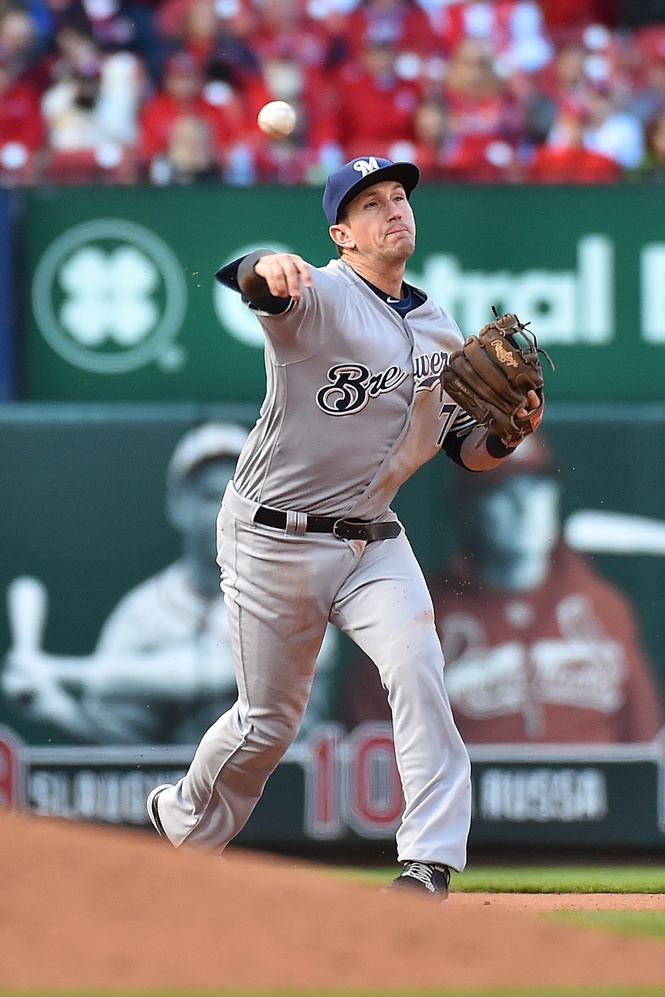Colin Walsh is currently the Brewers’ least-used position player aside from Martin Maldonado, the backup catcher, who clearly is in a category of his own. Aaron Hill has been the regular third baseman, and Yadiel Rivera’s ability to play shortstop makes him a more compelling option off the bench. But Walsh is a Rule 5 pick from the A’s this past offseason, which means he has to spend the entire season on the big league roster if the Brewers want to keep him.
Walsh is a low-upside player that the Brewers brought in as a potential infield option, but that doesn’t make him unique in any definable way. The Brewers brought in several players who fit that same archetype, and Walsh doesn’t have a particularly better chance of succeeding than Will Middlebrooks or Garin Cecchini. But Walsh is the one who made the big league club out of spring training, and he is the one who has gotten the first opportunity to prove himself.
I don’t have a great explanation for why that is, to be honest. Walsh was a college draftee in 2010, and college players with any sort of promise are supposed to move quickly through minor league systems. But Walsh didn’t; despite spending years in the Cardinals’ magical player development system, he didn’t make his big league debut until this season with Milwaukee. And Walsh’s minor league line doesn’t engender any confidence, either. His career minor league line of .278/.395/.422 is acceptable but not anything special, particularly for someone who was not especially young for any level he was playing at.
That line is also indicative of the type of player Walsh appears to be, and his pedigree supports this idea as well. As a mid-round Stanford product, one would reasonably assume that Walsh was a polished, disciplined hitter without a ton of power–with any sort of power upside or exceptional hit tool, he’d have been a higher-round pick. And his minor league numbers support this idea: his string of high walk rates and low ISOs indicate someone who has a very good idea of what he is doing at the plate but lacks the elite talent to capitalize on this.
All of this creates an image of a journeyman who is finally getting a chance to establish himself. However, it is coming at the expense of equally unqualified players who at least have prospect pedigrees. Both Middlebrooks and Cecchini were top-100 prospects at one point in the distant past, and Walsh was never thought of that highly. In a vacuum, then, giving Walsh this much playing time seems a bit bizarre.
But there are a couple possibilities, and it is difficult to know exactly what the Brewers were thinking when they decided to keep Walsh. The practical and pragmatic perspective would be that Walsh’s Rule 5 status makes him unique–the Brewers view him as just as valuable an asset as anyone else, but the only way for them to keep him in their organization was to put him on the big league roster. This way, at least, Walsh gets an opportunity to prove himself. After all, if Walsh fails, the Brewers can still give Cecchini or Middlebrooks a chance. But if the Brewers had not opened with Walsh on the big league roster, he would have been offered back to the A’s.
The more optimistic view is that the Brewers simply decided to give Walsh a chance. Cecchini and Middlebrooks have been on big-league radars for years, and neither has lived up to the promise they showed a few years ago. Walsh, though, has never had that same type of opportunity, so perhaps the Brewers simply decided to give the unknown a shot.
I am, of course, assuming that the Brewers did not make a decision based on just spring training performances, as such an overreaction would be completely out-of-character for a front office that has been so progressive on every other level. This is especially true given that Cecchini got just 15 spring training at bats with the big league club, so clearly the organization had some preconceived ideas about what it was going to do. Ultimately, though, I don’t know which rationale was the club’s primary motivating factor, but we do know that Walsh is the one who is getting the first chance.
